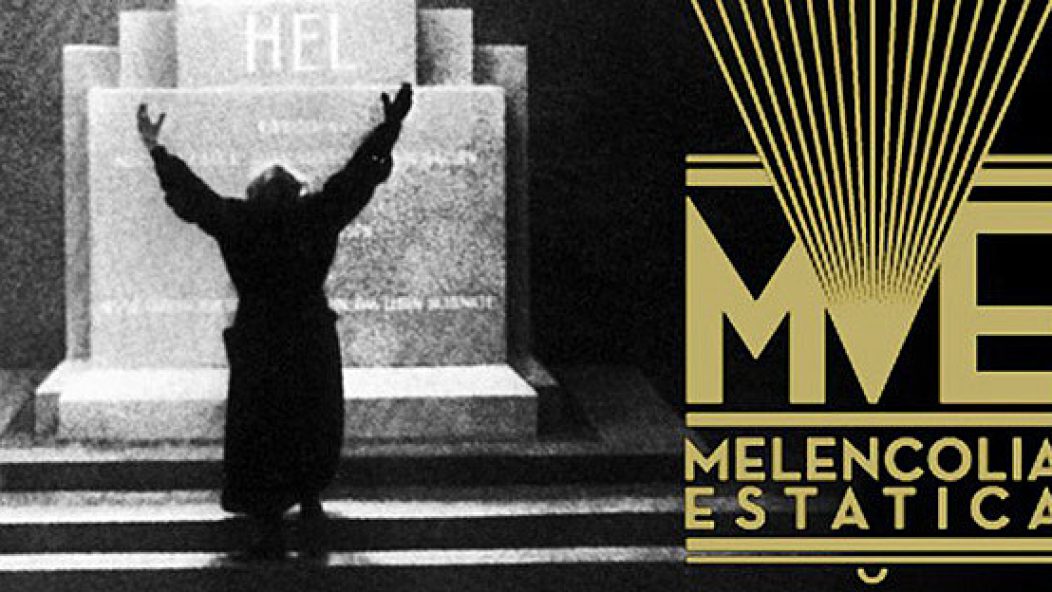
Interview: Climaxia of Melencolia Estatica

…
I never cared much for film. For whatever reason, it always made more sense for me to devour the written words, envisioning scenarios and painting landscapes with my mind’s eye rather than relying on someone else’s perspective. It took a visit to the Berlin Film Museum last November to shake me of that stubborn view, and for my companion’s insistence that I focus on one particular exhibit on one remarkable film to seal the deal. Fritz Lang’s 1927 masterwork Metropolis offers viewers a look deep into a jarring, dystopian world that still strikes a chord with those of us living in the aftermath of 1984. The similarities are impossible to ignore; a CCTV camera is pointed at the front of my house as I type. One only hopes that Lang’s vision of an industrialized, soulless future won’t prove to be quite as prescient as Metropolis threatens.
Climaxia, the main songwriter, composer, and founder of relatively obscure Italian black metallers Melencolia Estatica, is an ardent fan of Lang’s work. She found herself especially drawn to the iconic film in question, around which the band’s third and newest album, Hel, is based. It’s the band’s first release since 2008’s Letum (ATMF) and the first to feature new vocalist/lyricist Afthenktos alongside drummer Thorns and Climaxia’s guitars, bass, and vocal orchestrations. Begun as a one-woman project and gradually expanded to include outside influences, Melencolia Estatica remains Climaxia’s sole vision, and conjures up haunting, cold, adventurous black metal for the end of days.
Shortly after Temple of Torturous released the six-song LP, she answered a few questions for us about the band’s rebirth, the new album (stream a song below), and human damnation.
…
Could you please give me a bit of background on Melencolia Estatica? The project went on hiatus after 2008’s Letum; how did you come to revive it?
Many years have passed since I started to write material for M.E. My purpose was to create different, personal music inspired by my point of view on various topics and emotions, and trying to create something different compared to the music I was playing with Absentia Lunae in that period. The first release was a good start for M.E, lots of people gave their attention to that album and the good response gave me the opportunity to start working on Letum; it remains one of the best albums I have ever recorded. Letum was an important step for the project, a big step forward for the old M.E. that got very close to the result I was trying to achieve with Hel. Besides that, we did a couple gigs during the release of Letum that helped me to understand that Melencolia Estatica was the kind of project that worked best during gigs.
Vocalist/lyricist Afthenktos is a more recent addition to the band, after Solitudo’s departure. Has it been difficult getting comfortable with a new voice and new way of writing lyrics? How did he end up joining the band?
I’ve known Afthenktos for many years but we’ve only been working together for a couple of years. Our first collaboration was with the project Lintver, and the alchemy between us worked in such a positive way on the recordings that I wanted to extend our collaboration with M.E. The transition between two such differnt modes of singing has been been easy because Hel is distinguishable from previous music in many aspects of the composition and atmospherics; a change of voice was inevitable. Afthenktos gave a very important contribution in the writing of the lyrics that fully realized the initial idea I had in mind before the recording of Hel.
You’ve been involved in a couple other bands as well, notably Lintver and Absentia Lunae. Are you currently working on any material for those bands, or just focusing on Melencolia Estatica for now?
At the moment I’m focusing on the gigs with M.E., the idea would be to do another concert in 2013 in Italy or abroad. For sure I’ll take a break before starting work on the concept of the next album. Lintver is currently on standby, I would like reprint the CD with a more well-known label to raise awareness of this project to fans of black folk metal. With Absentia Lunae, we are in the process of recording.
A song stream and more of our interview with Climaxia is below…
…

…
Hel is split into six movements of haunted, depressive black/doom metal horror. What went into the creation of this album?
I started to record the riffs of Hel with the intentions to create something totally different from the previous albums, musically and in regards to production. During that period i was very involved with lots of different kind of music…industrial, noise, martial and ambient music. Gnaw Their Toungues was one of the bands I really liked and the idea to put inside Hel some orchestrations helped me to “evoke” very interesting atmospheres. My wish was to create a balanced mix between fast and aggressive parts and scary, doomy atmospheres made by orchestrations, choirs and voices. Speaking of the vocal work, it’s been one of most important element on Hel…I have tried to play with different harmonies to make the female vocals a bit interesting and innovative, not like the usual choirs you hear listen in metal; the same with the Afthenktos singing, we meshed up our ideas to find out something interesting and more fitting for the feeling of the album.
The word ‘Hel‘ itself is loaded; visions of damnation, mythology, deathly goddesses, and destruction loom. What was the overarching concept behind the record? Which ‘Hel‘ do we visit here?
Hel must be definitively interpreted as a symbol. It is obviously the character taken from Metropolis, but it is also an image of human damnation. In front of the statue, the builder of Metropolis lost his mind and was driven insane. He came to ignore the inhabitants and their needs, becoming a tyrant, turning the real makers of its city into slaves. He decided to follow the wrong ideals and all these ideals were represented by his dead wife’s statue. Of course Lang’s interpretation was religious, but I prefer to consider it far from that. It is something wider: the powerful man follows his needs and his needs only. Hel is the physical representation of these needs.
The references to the film Metropolis are obvious, from the artwork itself to the claustrophobic, alien nature and cinematic feel that the songs themselves exhibit. How did you aim to interpret Lang’s vision of a cold urban future with your more organic musical compositions?
First of all considering the situation nowadays we can claim that Lang’s vision is no more a probable future, but the present we all live. So the music was born as an ideal soundtrack to the modern metropolis, a sort of description of what Metropolis has become and always was. This turn the songs into a journey and not only a story. Our goal was to take the listener into Metropolis and feel the city around him. I hope we succeeded.
You’ve changed your stage moniker several times over the course of your musical career. Why have you settled on ‘Climaxia,’ and why did you choose a name with such sexual overtones?
Eh, I never thought about my name in a sexual way…. It’s been a long time. I guess I was 16 years old when I took that name. It was inspired by poetical structures, based on literature, but yes, sex is an important part of life wherein everyone can express lots of different emotions and perversions however it’s possible.
The transition from solo project into full-fledged cooperative band must have made for a rather big adjustment. One now wonders – will M.E. be playing any live gigs in the near future?
I still consider M.E. as a solo project, the use of session members is a way to get in concrete thoughts and ideas that would otherwise remain abstractions. The line up is not fixed in the future and certainly there will be changes, even from that point of view. In November, we had to play in Italy and definitely gave me satisfaction, I definitely would like to do a couple of dates in Italy or in Europe.
What are your plans for the band in 2013?
Surely get some rest and some live dates if we can arrange good conditions for gigs. Surely after the summer I will focus my attention again on M.E. and the creation of a fourth album … but for now I don’t have any new material to work with. I would like record a split but we will see in the next future.
Who are a few Italian bands (besides Mortuary Drape!) that you think deserve more attention?
In this period I don’t follow the Italian scene too much, but I got the chance to hear a solo project I really liked, “Anamnesi” – the kind of music is a mix of black metal with lots of ambient influences, very interesting. The artwork has also been created by Mark Thompson, who is one of my favourite artists.
…










